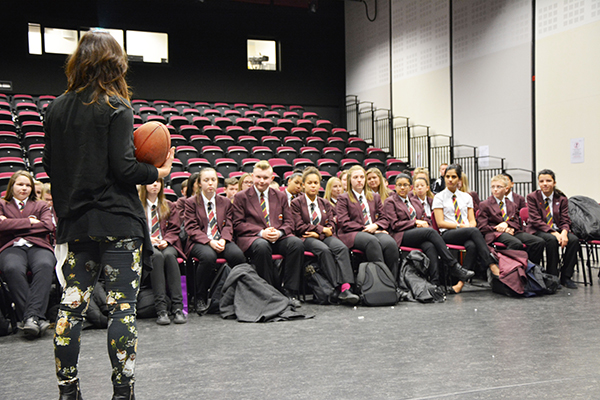Today marks the first day of National Careers Week (7th-11th March). Founded by RSA Fellow Nick Newman, NCW is an annual awareness-raising week, celebrating careers guidance and encouraging education providers to bring together students, local employers and advisers through careers events and activities.

Schools have had responsibility for providing high quality impartial careers education, information, advice and guidance (CEIAG) to their students since 2011 but, with no extra funding accompanying this responsibility, many have struggled to deliver this effectively. And so, considering the newly-formed Sub-Committee on Education, Skills and the Economy recently launched an inquiry into the “patchy and complex” world of careers education, a dedicated careers week at a key time in the academic calendar seems a great opportunity for schools to focus on careers guidance activity.
One reason why an initiative like National Careers Week is so important is that high quality careers education is crucial for social mobility. Students from the most disadvantaged backgrounds are twice as likely to end up NEET (Not in Education, Employment or Training) as their more affluent peers and only a quarter of boys from working-class backgrounds end up in professional or managerial jobs, which is why the Sutton Trust’s Mobility Manifesto cites provision of good quality personalised careers education as one of ten policies that urgently need to underpin the social mobility agenda.
At RSA Academies, we prepare students across the Family of Academies for the world beyond school by enabling students at all stages of their schooling to develop a wide range of skills and knowledge, so they can thrive in their continuing education, the world of work and in society. As part of our distinctive approach, we are developing a strong alumni network of former RSA academies pupils, who will not only provide role models for pupils at their old schools but also give one another a network of peer support, connected to the RSA Fellowship. We also have a partnership with the University of Warwick to help raise aspirations and inspire interest in and understanding of Higher Education – a highlight of this is the annual Warwick residential for year 8 students, with one pupil commenting that “this weekend has made me realise what great opportunities are available at university, and has inspired me to make new and different choices.”

Another important strand of our work is helping students to develop the range of skills and competences that will enable them to be effective leaders. This is done through our student leadership programme and annual Takeover Day held at the RSA, where students have the chance to pitch a school or community-based project and turn their ideas into reality.
Many key aspects of our programmes involve RSA Fellows. Our Broadening Horizons mentoring scheme recruits Fellows to mentor students to help broaden their experiences and act as a ‘critical friend’. We have also had Fellows visit our schools to talk about their careers, launching formally next year as our ‘Careers in the Classroom’ programme, as well as Fellows helping our students connect the world of work through projects such as Wyrd.
We are hoping that we can continue to be supported by the RSA Fellowship, and beyond, in order to facilitate students from across our academies to access high quality careers education through mentoring, careers fairs and talks, workplace visits and work experience opportunities. If you are local to the West Midlands area and would like to get involved, whether an RSA Fellow or not, please email Roisin.Ellison@rsa.org.uk to find out more.

Join the discussion
Comments
Please login to post a comment or reply
Don't have an account? Click here to register.
RSA Fellows might consider getting involved with the government's Enterprise Adviser programme which I piloted in the Leeds City Region last year. It is now managed by the Careers and Enterprise Company working in partnership with the LEPs and aims to match individuals to schools and colleges who can advise on ensuring that young people get access to education, information and inspiration to inform their career choices and develop their enterprise skills. My particular lobby is to ensure students know about self-employment as a career option and I am currently working with the Federation of Small Businesses in West Yorkshire to promote this.
Extract from a report into the causes of Gender Pay Gaps may be relevant to this discussion?
See full report at: http://www.fairplaysouthwest.org.uk/images/The_Gender_Pay_Gap_elimination.pdf
"2.4 Inadequate advice and guidance on career and study options
The data analysed in Part 1 confirm that women and men choose different study topics and occupations throughout their lives, and that these choices lead to women being in lower paid jobs.. For example, very few women choose engineering as an occupation, though a growing number are choosing other STEM subjects. The fall-out rate from working as an engineer is also higher for women than it is for men. This is one of the highest paying professions for full time men (see appendix 1).
There are many theories on why women make these choices, including the beliefs that such higher paid jobs are ‘men’s work’, that they cannot be combined with caring responsibilities and that they are physical and non-creative. There is an important role for advice and guidance providers in countering some of these beliefs, but consultations suggest that young people nowadays receive almost no careers advice and what there is to a large extent reinforces prejudices rather than opening up options. The role of making provision for advice and guidance has been delegated to schools; some of them commission outside experts but many expect teachers to fit it into their busy schedule with almost no support or training. It is also believed that many schools value the A-level/University route more than vocational education and steer their pupils accordingly. There is an urgent need to reinstate a professional independent careers advice and guidance service and ensure that schools and colleges use it. Such a service should be subject to the public sector equality duty to promote equality of opportunity including for women.
The support for providers of advice and guidance should include adequate labour market information including potential earnings and employer demand for skills. Employers, too, have a role to play in ensuring that their workplace culture and practices match their claim to be an equal opportunities employer; for example, consultations reveal that many women leave well paid jobs because “I don’t want to have to behave like that to get on”.
Thanks for this Jackie, a really interesting and enlightening read.
Unfortunately there is no mention, in the Blog, of the role of Further Education Colleges in providing good careers advice. Many schools will not allow Further Education Colleges access to their pupils in order to provide careers information, for fear of loosing them from their 6th Forms. Last week's unfortunate incident before the Education Select Committee has done nothing to further the aim of allowing FE Colleges access to provide Careers Advice in schools. It appears we will have to wait for the proposed legislation before it becomes a right of access. For those who know nothing about the incident it was succinctly commented on by the CEO of the Association of Colleges as follows: "Sir Michael Wilshaw, Her Majesty's Chief Inspector (HMCI), gave evidence to the Education Select Committee session this week andrepeated his criticisms of colleges for being too large and for failing to help vulnerable students. He said he was offering his private and personal opinions, which suggests he no longer thinks he needs to read or discuss the reports that his inspectors produceon colleges. Skills Minister, Nick Boles, was applauded at a reception for governors the same day when he said that the chief inspector was acting inappropriately."
Hi Gareth - you're right, Further Education Colleges do have a really important role in providing high-quality careers advice. We are very much intending to develop partnerships with FE colleges local to our schools.
On Michael Wilshaw's comments, you may be interested in my other recent blog on HE vs FE: https://www.thersa.org/discover/publications-and-articles/rsa-blogs/2016/02/blog-higher-education-vs.-further-education--are-young-people-being-short-changed/
Thanks Roisin. You make a convincing argument re HE and FE. I am glad to hear that you are going to develop partnerships with FE colleges and that you do not fall into that camp where "It is also believed that many schools value the A-level/University route more than vocational education and steer their pupils accordingly." as Jackie Longworth identified..